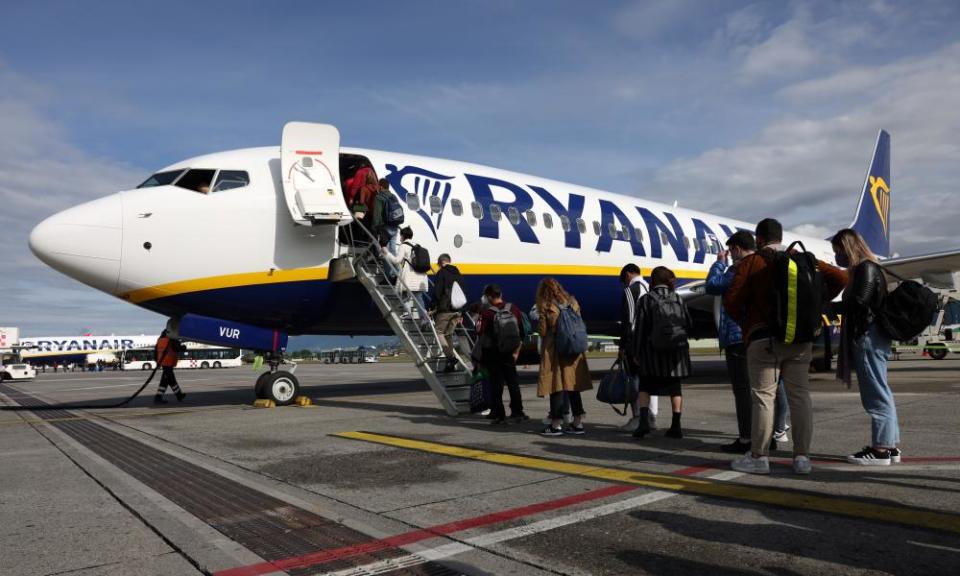Ryanair warns of ‘fragile’ recovery as Ukraine war and Covid push it to loss

Michael O’Leary says airline hopes to return to ‘reasonable profitability’ but declines to make forecasts
Ryanair has warned of a “fragile” recovery in airline passenger numbers after Russia’s invasion of Ukraine and the Omicron coronavirus variant pushed it to a €355m loss for the financial year.
The Irish airline would aim for a “return to reasonable profitability” over the financial year to March 2023, it said on Monday, after it lost €1.4bn (£1.2bn) during the first two pandemic-affected financial years.
Airlines have been hanging on for the return of passengers following two years of travel restrictions. There were high hopes for significant earnings in the 2022 summer holiday season after many countries lifted bans on tourism, but the knock-on effects of Russia’s invasion of Ukraine plus staffing difficulties have clouded airlines’ prospects.
Related: ‘The job kills any life really’: secrets of a UK airport security officer
Michael O’Leary, the Ryanair chief executive, said “we hope to return to reasonable profitability” in the coming year and highlighted “pent-up demand” despite uncertainty. The “recovery is strong but can be fragile”, he said. “With luck we’ll have a strong summer.”
Russia’s invasion of Ukraine and the rapid spread of the Omicron variant “immediately damaged close-in bookings and yields for the Christmas and Easter peak travel periods”, O’Leary said.
Ryanair’s revenues tripled to €4.8bn in the year to 31 March 2022 compared with the first year of coronavirus lockdowns. The airline is planning to fly 165 million passengers in the current financial year, up from 97 million in the year to March and an increase even on its peak of 149 million passengers in the years before Covid-19.
Yet the company said that ticket pricing in the current financial quarter “continues to need stimulation” with lower prices to attract more customers. Airlines’ ability to attract customers at higher prices is likely to be impacted in the coming months by the cost of living crisis, with families left with less money to spend after covering rising fuel and food prices.
O’Leary nevertheless said the company was better placed than rivals, and that it would use any weakness in demand to take a greater market share. He said: “There’s a lot of capacity cutbacks and hopefully we’re going to be the beneficiaries of that.”
Ryanair is not having to cope with delays in recruitment suffered by rivals as they wait for security approvals, he added, although he criticised airports for failing to cope with increasing numbers of passengers, leading to queues at airport security in several city hubs including Heathrow and Manchester in England. He said he hoped those problems would ease in time for the peak summer period.
“We are seeing pinch points in airports,” he said. “In Dublin, Berlin, there are airport security queues, where they are struggling to get low-wage, frontline crew into work.”
O’Leary also said he was concerned that rivals had “talked up” the prospects for a strong summer, and that there was a need for caution going into the winter because of the possibility of a new coronavirus variant or a worsening global economy amid global inflationary pressures.

 Yahoo Finance
Yahoo Finance 